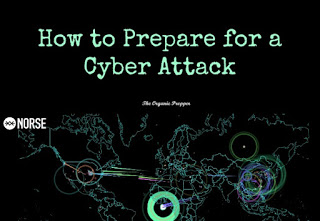 By Daisy Luther
By Daisy Luther
There is a lot of debate on whether Wednesday’s computer issues that shut down the New York Stock Exchange, the Wall Street Journal, and United Airlines were just a very strange coincidence (very strange) or a deliberate cyber attack.
This isn’t the first possible cyber attack on the United States this year. Heck, it’s not even the first one this summer. On June 5, Reuters reported a breach occurred that compromised the personal information of millions of federal employees, both current and former. This breach was traced back to a “foreign entity or government.”
Regardless of the origin of the so-called computer “glitches” that shut down Wall Street and a major airline, the events of Wednesday gave us just a tiny glimpse at how serious a cyber attack could be.
What exactly is a cyber attack?
A cyber attack is more than just shutting down the computer systems of a specified entity. It is defined as “deliberate exploitation of computer systems, technology-dependent enterprises and networks. Cyberattacks use malicious code to alter computer code, logic or data, resulting in disruptive consequences that can compromise data and lead to cybercrimes, such as information and identity theft.”
Technopedia lists the following consequences of a cyber attack:
- Identity theft, fraud, extortion
- Malware, pharming, phishing, spamming, spoofing, spyware, Trojans and viruses
- Stolen hardware, such as laptops or mobile devices
- Denial-of-service and distributed denial-of-service attacks
- Breach of access
- Password sniffing
- System infiltration
- Website defacement
- Private and public Web browser exploits
- Instant messaging abuse
- Intellectual property (IP) theft or unauthorized access
Cyber attacks happen far more frequently than you might think. Check out this real-time map for a look at the almost constant siege.
How does a cyber attack affect you?
 You may think that if you don’t spend your day working online, that an attack on our computer infrastructure isn’t that big of a deal. You may feel like it wouldn’t affect you at all.
You may think that if you don’t spend your day working online, that an attack on our computer infrastructure isn’t that big of a deal. You may feel like it wouldn’t affect you at all.
Unfortunately, there are very few people in the country that would remain completely unaffected in the event of a major cyber attack. Our economy, our utility grids, and our transportation systems are all heavily reliant upon computers. This makes us very vulnerable to such an attack.
And by vulnerable, I mean that if it was done on a big enough scale, it could essentially paralyze the entire country.
Here are some of the systems that are reliant on computers.
In the event of a widespread cyber attack, the following could be either completely inoperable or breached:
- Gas stations (most of the pumps are now digital and connect right to your bank).
- Banks (all of the records are online) would not be able to process electronic transactions. ATM machines would not function to allow customers access to cash.
- Utility systems (most power stations are run by computers).
- Water treatment facilities (these are automated too).
- Protection of personal information, including data about your finances, medical records, physical location, and academic records – everything a person would need to steal your identity
- Government operations, including dangerous identifying information about federal employees or members of the military.
- Transportation systems (trains, subways, and planes are heavily reliant upon computers).
- Traffic management systems like stoplights, crosswalks, etc.
- Air traffic control.
- Everyday trade – most business have a computerized cash register that communicates directly with banks. Many business are also reliant on scanning bar codes for inventory control and pricing. Point-of-sale systems would be down and people would not be able to pay using credit or debit cards.
- Telecommunications systems can be affected if cell towers are disabled or if the landline system were directly attacked. As more people rely on VOIP, taking down internet service would serve a dual purpose.
- SMART systems could be shut down or manipulated. All of those gadgets that automate climate control, use of utilities, or appliances through SMART technology are vulnerable.
Here’s a video from NATO that explains a little bit more about the dangers of cyber attacks.
Prepping to survive a cyber attack
Prepping for a cyber attack is not that different from prepping for other types of disasters that affect the grid. You want to be able to operate independently of public utilities, stores, or public transportation.
 Click each item to learn more details.
Click each item to learn more details.
- Have a supply of water stored in case municipal supplies are tainted or shut down.
- Be prepared for an extended power outage.
- Have a food supply on hand, as well as a way to prepare your food without the grid.
- Keep cash in small denominations on hand in the event that credit cars, debit cards, and ATMs are inoperable.
- Keep vehicles above half way full of fuel, and store extra gasoline.
- Be prepared for off-grid sanitation needs.
- Invest in some communications devices like ham radio or one of these other options.
- Be ready to hunker down at home to avoid the chaos that could come in the aftermath of a massive cyber attack. Be prepared to defend your home if necessary.
- Remember that your prepper supplies and skills will see you through this disaster
just like any other. - Protect your identity with a service like LifeLock (which will alert you to suspicious activity once things return to normal). Use some of these tips to keep your information locked down.
What do you think?
So, let’s hear from the “hive mind” of the preparedness community. How likely do you think it is that we’ll be hit by a massive cyber attack? Was the event on Wednesday just a coincidence or some kind of test run? What other effects do you think a massive cyber attack might have? Do you have any additional preparedness tips for such an event? Share your thoughts in the comments section below.
Daisy Luther lives in a small village in the Pacific Northwestern area of the United States. She is the author of The Organic Canner, The Pantry Primer: A Prepper’s Guide to Whole Food on a Half-Price Budget, and the soon-to-be-released The Prepper’s Water Survival Guide: Harvest, Treat, and Store Your Most Vital Resource. On her website, The Organic Prepper, where this article first appeared, Daisy uses her background in alternative journalism to provide a unique perspective on health and preparedness, and offers a path of rational anarchy against a system that will leave us broke, unhealthy, and enslaved if we comply. Daisy’s articles are widely republished throughout alternative media. You can follow her on Facebook, Pinterest, and Twitter,.

outdated electric grids in this nation have left us vulnerable as I’ve been informed, right or wrong?that when the electricity flicker( power surges/)or goes out that at that moment the hacking can occur as one’s systems are the most vulnerable. Even good power surge strips have not prevented the modem box from going out. and malware came through it our IP provider said. The electric smart meters do not use broadband but radio frequencies and thought that was the issue when even the It provider thought it was broad band too and frequency too close or using the same one?… But in our area we have twice the households and still only one electrical company transformer as we did 17 years ago, for our community. So I asked OG@E if we could put a super power surge strip before it got to the smart meter and they did not take the suggestion well. OF COURSE I WANTED THEM TO PAY FOR IT. AS IT WOULD GO ON THEIR ELECTRIC POLE. YES, WE DO NOT YET HAVE UNDERGROUND WIRES FOR OUR ENERGY YET.JUST ONE MORE REASON TO GO SOLAR OR WIND, AND INSTEAD OF ALL THOSE KITCHEN APPLIANCES ON THAT GRID, GET ONES IT AND DECIDES ON IT. BUT IN OUR AREA WE HAVE NO ONE TO INSTALL SUCH AND THE COST IS FAR BEYOND THOSE ON MODEST OR FIXED INCOMES. SO YUHC OF OUR VULNERABILITY MAY BE BACK TO THE BASICS OF US SPENDING BILLIONS IN EVERY OTHER NATION TO UPGRADE THEIR ELECTRIC GRID AND NOTHING IN THE USA DESPITE THE INCREASED PRICES WE PAY FOR OUR ELECTRICITY. THERE ARE SOME THINGS WE HAVE TO SHARE THE COST OF IN OUR SOCIETY OR THE WHOLE NATION SUFFERS AND MAYBE THIS is just another basic one. I called the FCC AS IT APPEARED OVER THE LAST MONTH THAT EVEN THE MOST EXPERT IN IT SEEMED UNABLE TO GIVE ME A CLEAR ANSWER OF WHAT IS OUR ISSUE IN OUR HOME SYSTEMS. AND BEGAN TO GET ALL KIND SOF CONFLICTING ANSWERS FROM THOSE WHO KNEW A LOT OF A SMALL PART OF THE IT FIELD BUT LITTLE OF HOW IT CONNECTED TO THE REST OF THE ADJUNCT PARTS, LIKE ELECTRICITY. CONCLUSION: IT’S OUR OUTDATED ELECTRICAL GRID THAT MAKES US THE FIRST STEP TO BEING IT VULNERABLE.? Linda Joy Adams computer operator since 1967, but not an expert.
These days business ideas get faded soon. However, implementation on one idea produce another and so on. This post is shareable and useful for business owners. Thanks for sharing.
Florence Consulting